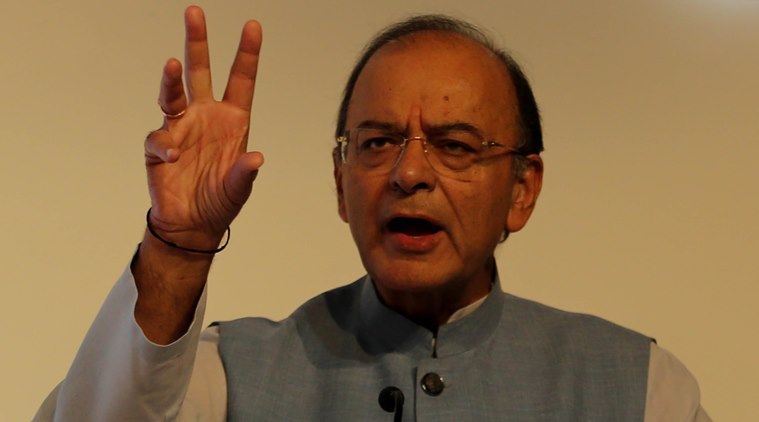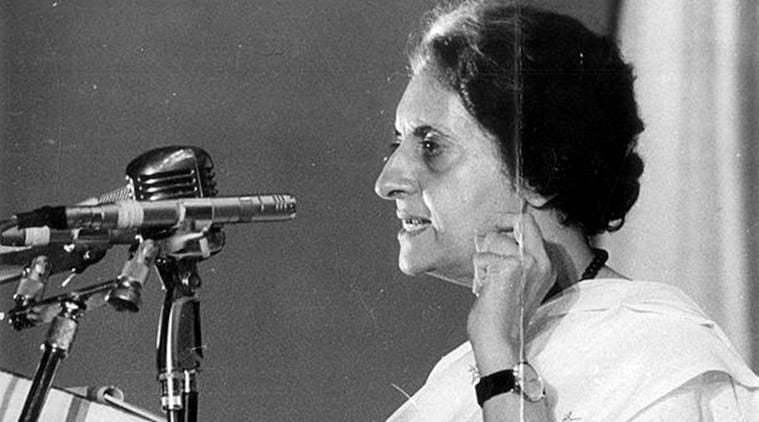Arun Jaitley revisits 1975 emergency, likens Indira Gandhi to German dictator Hitler
Jaitley, whose second blog of a three-part series coincided with the 43rd anniversary of imposition of the Emergency, claimed that unlike the German dictator, Indira proceeded to transform India into a "dynastic democracy".

Finance Minister Arun Jaitley (File photo)
Marking the 43rd anniversary of Emergency, Union Minister Arun Jaitley Monday drew parallels between former Prime Minister Indira Gandhi and German dictator Adolf Hitler by observing that both used the Constitution “to transform democracy into dictatorship”.
Jaitley, whose second blog of a three-part series coincided with the 43rd anniversary of the imposition of the Emergency, claimed that unlike the German dictator, Indira proceeded to transform India into a “dynastic democracy”. “Both Hitler and Gandhi never abrogated the Constitution. They used a republican Constitution to transform democracy into dictatorship,” he said.
On June 25, 1975, Indira declared a state of emergency across the country citing that security of India was threatened by internal disturbance. Between June 26 to March 21, 1977, when the Emergency was in force, the government of Indira Gandhi assumed draconian powers and crushed all dissent. Hours before the proclamation — through the night of June 25-26 — police arrested all major Opposition leaders, including Jaiprakash Narayan.
Revisiting circumstances leading to the imposition of Emergency, the finance minister went on to say that Indira enforced a state of Emergency under Article 352, suspended fundamental rights under Article 359 and claimed that disorder was planned by the opposition.
Hitler, who became the German Chancellor on January 30, 1933, got his President to invoke Article 48 of the country’s Constitution which gave emergency powers for the “protection of people in the State”, Jaitley said in a post titled The Emergency Revisited – Part-2 (3-Part Series): The Tyranny of Emergency.
“The decree giving emergency powers put restrictions on personal liberty, free speech… The pretext for imposition of Emergency was that on February 27, 1933, German Parliament House, known as ‘Reichstag’, had been set on fire,” Jaitley said. “Hitler claimed that it was a communist conspiracy to burn Government buildings and museums. Thirteen years later, in the Nuremberg trials, it was established that Reichstag fire was the handiwork of Nazis and Goebbels had conceived it.”
Further comparing both personalities, Jaitley said Hitler arrested most of the opposition MPs. “Mrs. Indira Gandhi arrested most opposition Members of Parliament and, therefore, procured, through their absence, a two-third majority of members present and voting and enabling the passage of several obnoxious provisions through Constitution amendments.”
The BJP leader said the 42nd Amendment diluted the power of High Courts to issue writ petitions, “a power which Dr. (B.R.) Ambedkar had said was the very heart and soul of India’s Constitution”.
“They also amended Article 368 so that a Constitution amendment was beyond judicial review. There were a few things that Hitler did not do which Gandhi did.
“She prohibited the publication of Parliamentary proceeding in the media. The law which gave mandate to the media for publishing Parliamentary proceedings was popularly known as the Feroze Gandhi Bill,” he continued.
Since Hitler’s own election has been set aside, he had no change to make in this regard. “Gandhi amended both the Constitution and the Representation of People Act. The Constitution amendment made the election of the Prime Minister non-justiciable before a court.
“The Representation of People Act was retrospectively amended to insert those provisions so that the invalid election of Gandhi could be validated by changes in law.”
He said amendments to the constitution made during Emergency were later reversed by the Janata Party government.
For all the latest India News, download Indian Express App
© IE Online Media Services Pvt Ltd
 Between June 26 to March 21, 1977, when the Emergency was in force, the government of Indira Gandhi assumed draconian powers and crushed all dissent.
Between June 26 to March 21, 1977, when the Emergency was in force, the government of Indira Gandhi assumed draconian powers and crushed all dissent.





































No hay comentarios:
Publicar un comentario